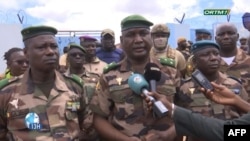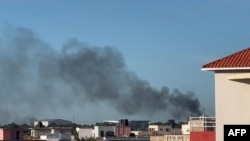An attack in the Malian capital, Bamako, targeting a military police training camp and airport left more than 70 people dead and 200 wounded, security sources said Thursday, one of the highest tolls suffered in recent years.
The attacks Tuesday in Bamako were the first of their kind in years and dealt a forceful blow to the ruling junta, experts said.
The death toll has put scrutiny on the junta's military strategy and its claims that the security situation is under control despite militants roaming the region for years.
The operation claimed by the al-Qaida-linked Group to Support Islam and Muslims (JNIM) has prompted widespread shock and condemnation within the West African country.
Many Malians have taken to social media to demand accountability for what they consider a security lapse.
Higher reported tolls
A security source, speaking on condition of anonymity, told AFP that 77 people had been killed and 255 wounded in Tuesday's attacks.
An authenticated confidential official document put the toll at around 100 and identified 81 victims.
The general staff acknowledged late Tuesday that "some human lives were lost," notably personnel at the military police center.
Mali's military-led authorities have so far given no indication of any future measures in response to the attacks, which were not mentioned in the minutes of Wednesday's cabinet meeting.
JNIM claimed that a few dozen of its fighters had killed and wounded hundreds from the opposing ranks, including members of the Russian paramilitary group Wagner.
The attack came a day after junta-led Mali, Niger and Burkina Faso marked a year since the creation of their breakaway grouping, the Alliance of Sahel States.
The three countries, which have been under military rule following a string of coups since 2020, have broken ties with former colonial ruler France and turned militarily and politically toward other partners, including Russia.
Bamako is normally spared the sort of attacks that occur almost daily in some parts of Mali.
The West African country has been ravaged since 2012 by different factions affiliated with al-Qaida and the Islamic State group.
Volleys of gunfire interspersed with explosions broke out in Bamako around 5 a.m. local time (0500 GMT) on Tuesday.
JNIM fighters attacked a military police school and stormed part of the nearby airport complex, where a military facility adjoins the civilian one.
The militant group broadcast images showing fighters strolling around and firing randomly into the windows of the presidential hangar and destroying aircraft.
Condemnation, condolences
Condemnation poured in on Thursday, including from U.N. Secretary-General Antonio Guterres, Mali's neighbor Senegal, African Union Commission Chairman Moussa Faki Mahamat and the U.K. Embassy.
The French Embassy in Bamako offered its "condolences to the government of Mali."
Jean-Herve Jezequel, Sahel project director at the International Crisis Group, told AFP that one hypothesis could be that "the jihadists are trying to send a message to the Malian authorities that they can hit them anywhere and therefore that the big cities must also be protected."
He said the aim could be to force the government to concentrate its resources in populated areas and have fewer troops in rural areas "where these jihadist groups have established their strongholds."
Against a backdrop of severe restrictions on freedom of expression under the governing junta, virtually no public figures in Mali have spoken out against the alleged security lapse.
The daily Nouvel Horizon, a rare dissenting voice, wrote on its front page that it was "time to apportion blame at all levels."





